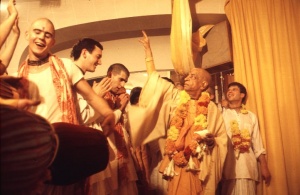SB 1.13.43 (1965)

A.C. Bhaktivedanta Swami Prabhupada
TEXT No 43
- Yatha kridopaskaranam samyoga vigamabiha
- Ichhaya kriditum syatam tatha eva isha ichhaya nrinam
ENGLISH SYNONYMS
Yatha—as much as, Kridopaskaranam—playthings, Samyoga—union, Vigamou—disunion, Iha—as much as, Ichhaya—by the will of, Kriditum—just for playing part only, Syatam—takes place, Tatha—so also, Eva—certainly, Isha—the Supreme Lord, Icchaya—by the will of, Nrinam—of the human being.
TRANSLATION
As by the sweet will of the player the playthings are set up and again dispersed, so also by the Supreme will of the Lord men are associated with other particular men and again they are separated.
PURPORT
We must know it for certain that the particular position in which we are now set up is an arrangement of the Supreme will in terms of our own act in the past. The Supreme Lord is present as the localised Paramatma in the heart of every living being as it is said in the Bhagwat Geeta (Bg. 13.22) and therefore He knows everything of our activities in any stage of our life. The reactions of our actions are rewarded by Him by placing us in some particular place. A rich man gets his son born with silver spoon in the mouth of the rich man but the child who comes as the rich man's son is a particular living being who deserved such place and therefore he is placed there by the will of the Lord. And at a particular moment when the child has to be removed from that place, is also carried by the will of the Supreme even the child or the father does not wish to be separated from the happy relation. The same thing happens in the case of a poor man also and either the rich man or the poorman nobody has any control over such amalgamation or separation of living beings. The example of player and the playthings may not be misunderstood. One may argue that the Lord is bound to award the reactionary result of our own action and as such the example of a player cannot be applied. But it is not so. We must always remember that the Lord is the Supreme will and He is not bound up any law. Generally the law of Karma is that one is awarded the result of one's own actions but in special cases by the will of the Lord such resultant actions are changed also. But this change can be effected by the will of the Lord only and no other else. Therefore, the example of the player cited in this verse in quite appropriate and the Supreme will is absolutely free to do whatever He likes; and because He is all perfect there is no mistake in any of His action or reaction. This change of resultant actions are specially done by the Lord when a pure devotee is concerned. This is assured in the Bhagwat Geeta (Bg. 9.30-31) that the Lord saves a pure devotee who has surrendered unto Him without any reservation, from all sorts of reactions of sins and there is no doubt about this. There are hundreds of examples of this changed resultant actions by the Lord in the history of the world. When the Lord is able to change the resultant reaction of one's past deeds then certainly He is not Himself also bound up by any action or reaction of His own deeds. He is perfect and transcendental to all laws.